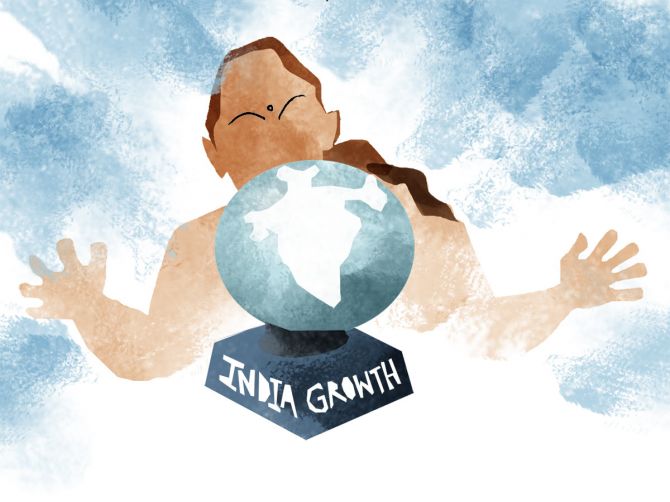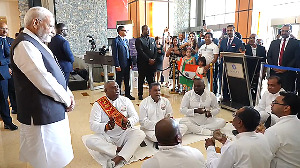'There will be positive growth, but if you ask me whether we are going to have the original growth rate of 8%, the answer will be, no.'

In a surprise move, the Reserve Bank of India hiked the repo rate early this month.
What kind of impact will the RBI's move have on the economy?
"The root cause of our problem is rising inequality," Dr Ajitava Raychaudhuri, professor of economics at Jadavpur University tells Rediff.com's Shobha Warrier in the concluding segment of a two-part interview.
Do you think the RBI should have waited for some more time to hike interest rates?
Just look at this year's Budget, the main point was capital expenditure.
But capital expenditure is a two-sided thing.
In the short term, it is a multiplier, but in the long term, it helps prospects for more infrastructure and growth.
Maintaining capital expenditure is a good idea. If that is done, growth will not be affected much.
The important thing is, you have to find out which are the areas that affect growth.
For example, just by hiking the petroleum price, growth will not be negatively affected. You have to pinpoint the sectors that will be affected.
The war no doubt will cause dislocations in certain sectors like petroleum and edible oil which will increase the subsidy bill of the government.
At the same time, maintaining growth should not be a problem especially when you have underutilised resources, when you have the scope of increasing production.
But it is not happening...
It is not happening because the government's policies have to be accelerated.
The government has a capital expenditure target.
But what is the private sector doing? What is the role of the private sector in an economy?
We have seen all over the world that when the public sector spending goes up, private investment also goes up; like when there is one rupee spent by the government, there is more than one rupee by the private investment. But that is not happening here.
The private sector has no confidence to invest. They say, there is no demand in the market...
It is absolutely correct. Yes, private investment is not happening because they have no confidence.
But even in the gloomy covid period, a lot of foreign investment came to India. It has picked up more now.
Why is foreign direct investment coming to India? Because they see India as a huge market. All the money that are floating in Western economies is coming to India.
But Indian private investors do not have the confidence in the market. But they also must take more risk.
When foreign investors have confidence in the Indian market, why are Indian investors so scared?
I also agree that not all risks can be borne by the private sector. The government should take more risks.
For example, the government gives loan guarantees to small and medium industries. These types of schemes should be expanded.
The PLI scheme stressed so much by the government during the last two years is a belated but wise move to link Indian manufacturing to the global supply chain.
Given the effort observed worldwide for multinationals to diversify their supply base for parts and components as well as raw materials, many East and South East Asian countries are competing to attract such relocation.
The PLI scheme in India is the government initiative to encourage the private sector to make things in India and this needs to be pursued with least bureaucratic delays and policy inertia.
Now that you spoke of lending, ever since the NPA crisis happened, lending has been sluggish. The RBI has now taken a decision to increase the cash reserve ratio to 50 basic points.
Will this not affect the lending cycle further?
The rate at which the banks will give loans will go up.
That will increase the capital cost of most of the industries.
But when the market starts picking up, the prospects of return also will go up.
For example, the IT sector, pharmaceutical sector and e-commerce sector are already reaping benefits.
I don't think a rise in the interest rate will have an impact on all the sectors.
I mean, not all sectors will be wary of taking loans.
In fact, if you look at the market, some sectors have a huge rise in their stock prices.
So, it will be a mixed bag when the interest rate goes up. It will not be a linear story.
As per the UNCTAD report, GDP growth in India may come down to 4.6% this year due to the war in Ukraine. But from 2016 onwards, we are seeing the GDP growth falling...
In 2015-2018, what are the factors that led to falling growth? Private consumption simply fell. Why?
You should understand that the driving force in an economy is household consumption.
After all, for whom do the producers produce? Consumption was affected for the last five years.
You should also understand that as a percentage of their income, the propensity to consume by the poor is much more. High-income people spend much less.
If you look at 2016-2018, you will see that income was tilting in favour of high income groups.
Earlier, as an example, if 50% was going to the poor and 50% to the rich, it changed to something like 70%-30% in favour of the rich.
The rural and semi-urban sector, which is the driving force of our economy, started spending less and less.
The truth is, income inequality rose in the last 5 years.
Consumption was falling because inequality was rising.
Low income people found uncertainty in their earning avenues rising leading to forced saving on their part in order to secure their future.
When the consumption percentage falls in GDP, it will have a negative multiplier effect on the economy. That was what we were seeing.
And when the consumption was not there, investors also lost confidence.
So, the root cause of our problem is rising inequality.
Will you see positive growth for the economy in coming days?
I do believe there will be positive growth, but if you ask me whether we are going to have the original growth rate of 8%, the answer will be, no.
It will definitely be less than 8%.
Feature Presentation: Aslam Hunani/Rediff.com











